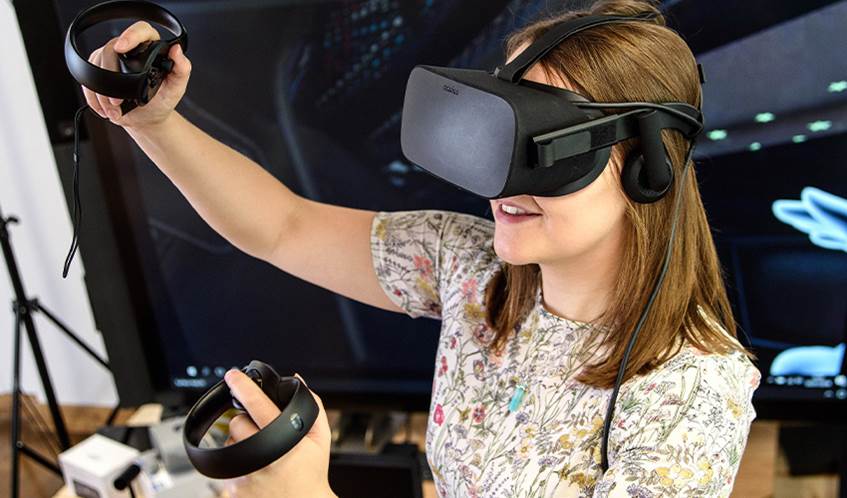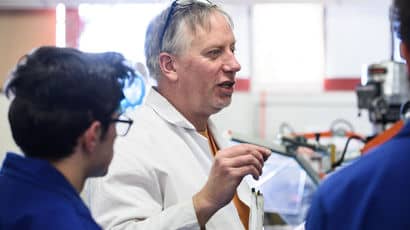New research reveals how virtual reality poses significant risk to children

A new study co-authored by UWE Bristol academic Verity McIntosh highlights how virtual reality is putting children at risk of child sexual abuse and exploitation.
The new research commissioned by the NSPCC entitled ‘Child Safeguarding & Immersive Technologies’ assesses what present and future risks children may face when using virtual reality.
It paints a concerning picture of abuse taking place through immersive technology and illustrates the harm that children are already facing in these spaces.
Verity McIntosh, UWE Bristol researcher and senior lecturer in Virtual and Extended Realities, undertook the research with Catherine Allen from Limina Immersive – both leading experts in this field.
Verity said: “Immersive technologies have extraordinary potential to positively impact society; offering more embodied ways to connect to one another at distance, unlocking creative potential, exploring new forms of identity and society, and enabling us to tackle global problems as digitally empowered citizens. Unfortunately, the first steps taken with this new suite of tools appear to have been taken without due consideration for the care and safety of children.”
The new report is released ahead of the Online Safety Bill being debated in the House of Lords and emphasises the important role regulation will play in tackling technology assisted child sexual abuse once this ground-breaking piece of legislation has been passed.
Key findings from the research include:
- VR multiuser spaces provide opportunities for offenders to commit child sexual abuse and exploitation against a child.
- ‘Phantom touch’* can mean that victims of VR sexual abuse experience the physical sensation of being touched without their consent.
- Offenders are using simulated child sexual abuse games on the dark web and through private networks that “mirror” the way they would abuse children offline.
- VR multiuser spaces can desensitise offenders with avatar disguise and anonymity ‘normalising’ their abusive behaviour.
- Multiuser VR worlds invite the creation of tighter knit offender ‘communities’, allowing for the sharing of child sexual abuse material and harmful behaviours to amplify and escalate.
The research includes insight from law enforcement agencies and experts and contains in-depth interviews with specialist coverts, who for the first time are sharing their information about emerging technologies that may pose risks to children.
UK law enforcement’s Online CSA Covert Intelligence Team (OCCIT) said in the study: “Virtual reality and the metaverse have the potential to be a monumental hurdle for law enforcement, criminal justice, and the safeguarding of vulnerable people. The proposed technology may have implications not seen since the global explosion of internet technologies.”
Crucially, the research includes key recommendations for technology companies, government, regulators, and law enforcement agencies on how to address abuse that takes place on immersive platforms.
Recommendations include:
- Technology companies must ensure immersive environments are safe by design for children by implementing robust child safety features and reporting systems.
- Ofcom should work closely with other UK regulatory bodies to develop clear guidance on how immersive technology platforms must assess and respond to the child safety risks on their products.
- Government must provide more guidance, funding and learning opportunities to law enforcement on how to deal with VR and simulated offences.
- Government must review the Online Safety Bill (Act) on a rolling basis to ensure that emerging harms are adequately covered under the law.
The findings from this research are due to be presented to key politicians, government officials and charity partners at an event in Parliament on Tuesday 5 September where the research and its recommendations will be presented to those influencing the new online safety regulatory regime currently making its way through Parliament.
Verity added: “Our research uncovered numerous existing patterns of offender behaviour using 'proto-metaverse' multi-user spaces for child sexual abuse and exploitation, with little expectation of discovery or legal consequence.
“We spoke with public and private sector stakeholders, including UK government and law enforcement to investigate the nature and scale of existing abuses, and to understand what might be coming next.
“Our report, presented at the House of Commons today, aims to give policymakers a coherent picture of current and future risks to children, and practical recommendations to create a more positive culture of safety by design, accountability for criminal behaviour, and empowerment for all children engaging with immersive technologies.”
This comes as YouGov research commissioned by the NSPCC shows that the public are concerned about the risks children may face in VR spaces.
When asked, three quarters (75%) of the public said they believe that 6–12-year-olds are at major or significant risk of child sexual abuse on the metaverse while 80% believe that 13 – 16 year olds are at risk.
Richard Collard, Head of Child Safety Online Policy at the NSPCC, said: “These shocking findings should be a wake-up call to us all about the harm young people are facing when engaging with immersive technology.
“Technology will continue to progress, and so must we to ensure that we can understand the existing and emerging risks that young people face in these virtual spaces.
“As the Online Safety Bill completes its passage through Parliament, it is vital that new and emerging technology forms a crucial part of the online safety regime. This will only be made possible through clear collaboration between educators, parents, policymakers, and the technology industry.”
Related news

10 February 2026
Work by UWE Bristol lecturer features in Government’s National Cancer Plan
Work by a UWE Bristol academic has been included in the Government’s National Cancer Plan.

23 January 2026
On-demand minibus services beneficial in rural areas but face financial challenges, trials suggest
Trials of ‘demand responsive transport’ minibus services boosted connectivity for people in rural and suburban areas, according to a new report produced by UWE Bristol researchers.

18 December 2025
UWE Bristol professor appointed National Institute for Health and Care Excellence CEO
Jonathan Benger CBE, Professor of Emergency Care at UWE Bristol, has been appointed as the new chief executive officer of the National Institute for Health and Care Excellence (NICE).

17 December 2025
Findings revealed from first UK study into experiences of mothers who are survivors of rape pregnancy
UWE Bristol academics have revealed the findings of the first UK-based study of the experiences of mothers who are survivors of rape pregnancy.

11 December 2025
Social media influencer work is far more demanding than it looks, research finds
A study exploring the mental health impacts of social media influencer work has revealed that life online is far more demanding than it appears.

25 November 2025
UWE Bristol experts join film Q&A exploring music and melodrama
Academics will take part in the Cary Comes Home Festival, with a post-screening Q&A exploring music, melodrama and emotional storytelling in classic cinema.

17 November 2025
Urgent reform needed to support ambulance-delivered end of life care, study finds
More than three quarters (78 per cent) of paramedics sometimes fear doing the wrong thing when caring for people in the last year of life, new research has found.

13 November 2025
Bristol’s screen industry experiences “boom-and-bust cycle” after post-pandemic recovery, new research from UWE Bristol finds
New research from UWE Bristol provides detailed insight into Bristol's screen sector.

13 November 2025
New AI research to revolutionise animal welfare
A UWE Bristol research project will combine behavioural science and AI to create technology that understands not only what animals do, but how they feel.

10 November 2025
Lessons from Low Traffic Neighbourhoods will drive better public engagement, study finds
Lessons from Low Traffic Neighbourhoods have informed a new toolkit to improve engagement with the public on challenging local street issues.

06 November 2025
First-of-its-kind study aims to help more people spend their final days at home
A new study will explore how architectural design could support end-of-life care in domestic settings.

29 October 2025
UWE Bristol academic unveils breakthrough in energy-efficient AI at NATO science forum
Dr Jonathan Lancelot has developed a new form of AI that could transform how intelligent machines operate in space, defence, and remote environments.
You may also be interested in

Media enquiries
Enquiries related to news releases and press and contacts for the media team.

Find an expert
Media contacts are invited to check out the vast range of subjects where UWE Bristol can offer up expert commentary.






